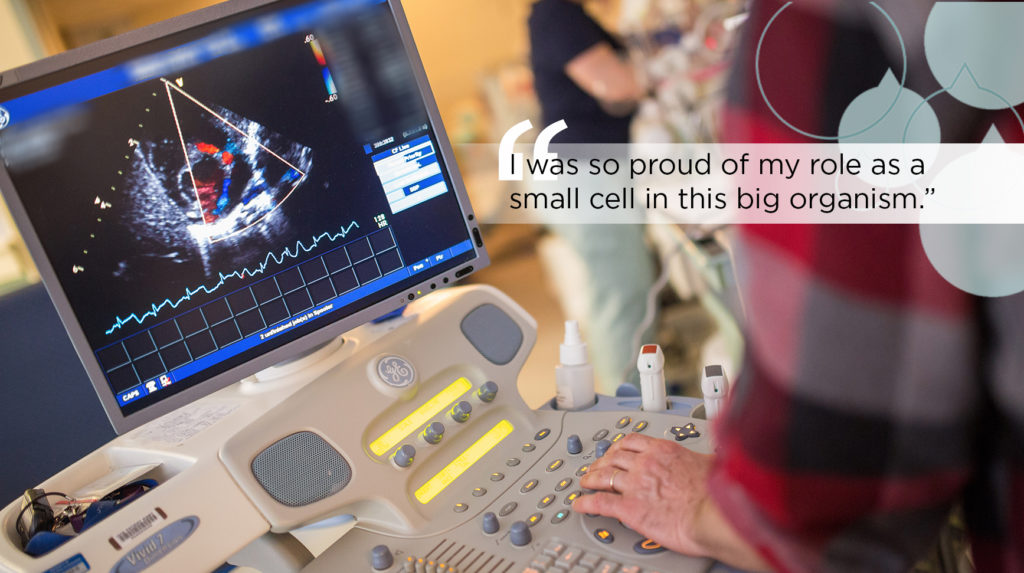
Introducing… a pediatric cardiologist
Dr. Dragos Predescu is a pediatric cardiologist at McMaster Children’s Hospital. He has been with Hamilton Health Sciences (HHS) since 2009 where he consults and treats children with heart problems. He has a special interest in optimizing patient care through standardized approaches and community-oriented collaboration.
What do you love most about your role?
What I find most humbling are parents who follow through with pregnancies despite some syndrome or some terrible cardiac malformation found in their baby, which could change their lives forever. In spite of multiple battle scars from chest surgery, those kids can still put up a smile for you. I especially like seeing my patients graduate from our care and then, as we say our goodbyes, watching the fleeting movie of our journey in their parents’ eyes. I love to be “the catcher in the rye.”
I have to take care of the parents too as they are the real heroes.
What do you find challenging?
One of the most provocative, stimulating or inspiring challenges I have is working with children with complicated or puzzling illnesses, and are in a desperate state. It encourages me to think outside the box to manage their condition. I have to take care of the parents too as they are the real heroes.
Describe a typical day
Some parts of my job, like days where I’m on-call, are really hectic. Working in the fetal clinics, on the other hand, seem more relaxed. I use those opportunities to catch up on incomplete tasks. Whatever the case, I typically do not have a standard eight-hour day.
The on-call days are usually around 12 hours or more. I usually start at 9 am with rounding on our admitted children. My aim is to get them ready for leaving the hospital as soon as possible. In between seeing inpatients, I also have to see a few of our outpatients that come for post-operative visits for things like echo-cardiograms, EKGs and Holter recordings. I will also do some phone consultations and teach our residents and students rotating through our department as I move.
What I love the most is despite some terrible outcomes hanging over some children, they can still put up a smile for you.
Occasionally, the maternal-fetal medicine staff will ask for a consultation on one of their fetus patients with cardiac abnormalities. Parents may have questions regarding the future of their little ones with cardiac problems. I have to be honest but I try to instill as much hope as possible. I sometimes take a break around 7 pm when I go home to see my family. Then, I return to finish whatever tests need to be reported that day. If I don’t get called to the hospital overnight, that’s a bonus!
Every day I find myself thinking about all the things we do not comprehend, and all my shortcomings. I think about the children and their parents, full of hope and understanding.
Tell us about your most gratifying experience at HHS
I recall one patient who was at the end of a long battle with her disease. Yet there we were in the middle of the night at her bedside with her parents, nurses and everyone else involved in her care. We all worked together in perfect harmony and with silent determination to pull through one more time. Until that time, HHS was more of an abstraction for me. That day, though, HHS became something so concrete I could almost touch it. It took a form I could understand and, more importantly, I could value, which was the total dedication to one another and collaborating to achieve a higher goal. That was the day I was so proud of my role as a small cell in this big organism.
HHS became something so concrete I could almost touch it.
What’s one thing people would be surprised to learn about your role?
What people may find surprising is my role is not any different than that of any other doctor I know working in this hospital. This reminds me of one of Aesop’s Fables. The one with the stag admiring his antlers in the river and decrying his legs.
People might be surprised to hear that once you’ve become a doctor, you never cease to be a doctor during the course of the day. There are moments when you might forget, only soon to be reminded by a neighbour, a colleague, a perfect stranger that collapses in front of you, or something you hear on the radio. But I cannot forget. There may have been a child I lost the other day, or I second guess myself about a recent procedure. They may not be surprised, though, if they are the kind of people passionate about what they’re doing. They may just be pleased.
